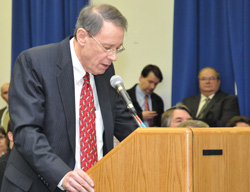If the Transportation Security Administration (TSA) had any illusions about how strongly the aviation community feels about their proposed Large Aircraft Security Program, those illusions were dispelled nearly half an hour before a Jan. 6 public hearing—the first of five—ever began. The hearing room, with seating for more than 100, was filled to standing-room-only capacity.
From the outset, the TSA panel members stated that they were there to listen. Except to answer three very specific questions, they did not respond to participants’ comments.
 AOPA Northeast Regional Representative Craig Dotlo
AOPA Northeast Regional Representative Craig Dotlo
AOPA Northeast Regional Representative Craig Dotlo told the TSA that AOPA has some significant concerns with the proposed rule: It outsources what should be an inherently governmental function—security oversight; it applies commercial standards to general aviation; and, its weight threshold captures very small aircraft, especially when compared to the aircraft used in the Sept. 11, 2001, terrorist attacks.
TSA hears from law enforcement authority
While AOPA plans to file formal written comments on the proposed rule, the association took advantage of the Jan. 6 public hearing to let the Transportation Security Administration (TSA) hear from a fellow law enforcement authority.
AOPA Northeast Regional Representative Craig Dotlo managed the FBI’s White Plains Field Office and was responsible for reviewing critical infrastructure facilities, including Westchester County Airport and Indian Point Nuclear Power Plant, in the wake of the Sept. 11, 2001, terrorist attacks.
“While the government must take every reasonable precaution to protect the homeland, it is recognized by most experts that it is virtually impossible to protect an open democracy with 10,000 miles of borders against every conceivable attack on bridges, tunnels, airports, nuclear power plants, chemical facilities, dams, and the list goes on,” Dotlo said at the hearing. “The real key to homeland security is a robust, efficacious, and sophisticated intelligence network that can identify prospective terrorist attacks and prevent them from occurring.”
As Andy Cebula, AOPA executive vice president of government affairs, noted, “It is absolutely vital that security officials hear directly from GA users, as they did at today’s public hearing. But it is equally important that they hear from people like Craig who are knowledgeable in both aviation and security and regulatory issues.”
“AOPA is concerned with the weight threshold that is used for the basis of the regulations and provisions in the rule that outsource security oversight to a third-party auditor,” Dotlo told the panel. “AOPA does not support the NPRM as currently drafted and requests that TSA reconsider the proposed rules, focusing particularly on whether there are less costly and less intrusive ways of enhancing general aviation security.”
The association is also concerned that the program could be applied to all aircraft and all airports in the future.
National Business Aviation Association (NBAA) President Ed Bolen emphasized those points as well, and recommended that the TSA establish an aviation rulemaking committee.
“We believe that by working together, we can harden business aviation against attack without destroying it in the process,” Bolen said. “We deserve a dialog about how best to do this.”
Speaker after speaker reiterated AOPA’s main points and NBAA’s call for an aviation rulemaking committee.
Other speaker comments included one person who said the TSA seems to be reversing its earlier posture that there is no one-size-fits-all security solution for general aviation. Another said that the TSA had not yet proven, at least publicly, that a credible terrorist threat exists from corporate aviation. And a third worried that such a large expansion of the fleet under the TSA’s oversight would dilute security resources.
“Whether it’s through an aviation rulemaking committee or some other mechanism, AOPA remains committed to working with the TSA to enhance general aviation security in the way that is least burdensome to our members,” said Craig Spence, AOPA vice president of aviation security. “AOPA will attend all of the remaining public meetings and will file more extensive written comments. We urge members to consider doing the same. You can check the AOPA member action center for more information on filing formal comments.”

